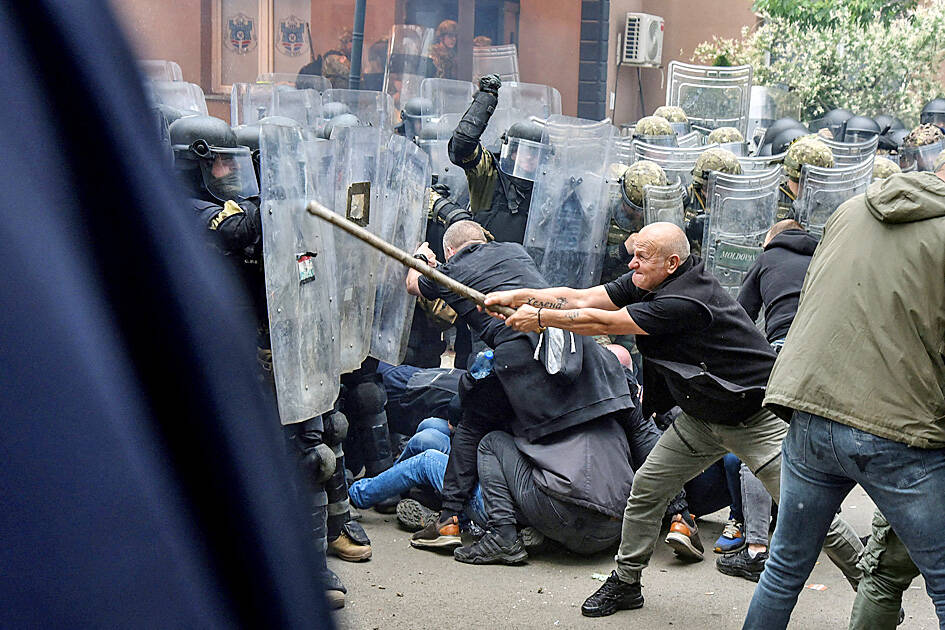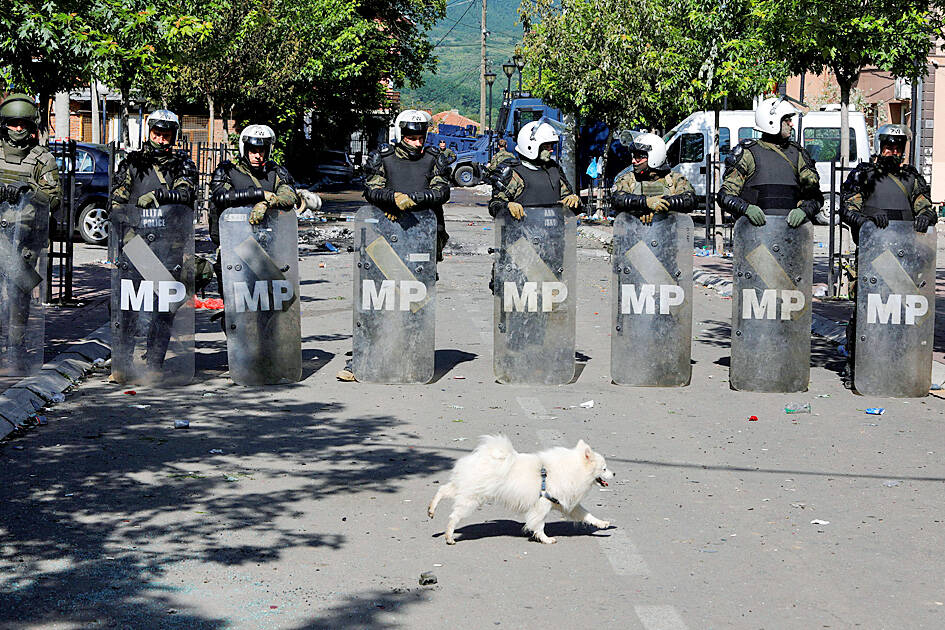Dozens of NATO troops yesterday secured a municipal building in the Kosovo town of Zvecan, a day after 30 NATO soldiers and 52 Serb protesters were injured in clashes that EU and NATO officials said were unacceptable as they urged calm.
Kosovar police said in a statement that the situation is “fragile, but calm.”
EU High Representative for Foreign Affairs and Security Policy Josep Borrell urged the leaders of Kosovo and Serbia to immediately de-escalate tensions, after “absolutely unacceptable” clashes in northern Kosovo.

Photo: Reuters
Borrell said he had spoken to Kosovar Prime Minister Albin Kurti and Serbian President Alexander Vucic to tell them to avoid any “further unilateral action.”
“I asked both parties to urgently take measures to de-escalate tensions immediately and unconditionally,” he said.
Borrell said Kosovar authorities needed to suspend police operations focused on municipal buildings in north Kosovo and ethnic Serb protesters should stand down.

Photo: Reuters
He said the EU was “discussing possible measures to be taken if the parties continue to resist proposed steps towards de-escalation.”
Russia said “decisive steps” were needed to de-escalate tensions in Kosovo.
“We call on the West to finally silence its false propaganda and stop blaming incidents in Kosovo on Serbs driven to despair, who are peaceful, unarmed, trying to defend their legitimate rights and freedoms,” the Russian Ministry of Foreign Affairs said.
Unrest in the region has intensified since ethnic Albanian mayors took office in northern Kosovo’s Serb-majority area after last month’s April elections the Serbs boycotted, a move that led the US and its allies to rebuke Pristina on Friday.
The area’s majority Serbs have never accepted Kosovo’s 2008 declaration of independence from Serbia, and consider Belgrade their capital more than two decades after the Kosovo Albanian uprising against repressive Serbian rule.
Ethnic Albanians make up more than 90 percent of the population in Kosovo as a whole, but northern Serbs have long demanded the implementation of an EU-brokered 2013 deal for the creation of an association of autonomous municipalities in their area.
Serbs refused to take part in local elections last month and ethnic Albanian candidates won the mayoralties in four Serb-majority municipalities — including North Mitrovica — with a 3.5 percent turnout.
Several ethnic Serbs gathered in front of the building in Zvecan, but the situation was calm, a Reuters reporter said, as soldiers from the US, Italy and Poland stood by in anti-riot gear.
A Kosovar police source who asked not to be named said that bulldozers were heading north, ready to remove any barricades set by Serbs.
Additional reporting by AFP

The US government has signed defense cooperation agreements with Japan and the Philippines to boost the deterrence capabilities of countries in the first island chain, a report by the National Security Bureau (NSB) showed. The main countries on the first island chain include the two nations and Taiwan. The bureau is to present the report at a meeting of the legislature’s Foreign Affairs and National Defense Committee tomorrow. The US military has deployed Typhon missile systems to Japan’s Yamaguchi Prefecture and Zambales province in the Philippines during their joint military exercises. It has also installed NMESIS anti-ship systems in Japan’s Okinawa

‘WIN-WIN’: The Philippines, and central and eastern European countries are important potential drone cooperation partners, Minister of Foreign Affairs Lin Chia-lung said Minister of Foreign Affairs Lin Chia-lung (林佳龍) in an interview published yesterday confirmed that there are joint ventures between Taiwan and Poland in the drone industry. Lin made the remark in an exclusive interview with the Chinese-language Liberty Times (the Taipei Times’ sister paper). The government-backed Taiwan Excellence Drone International Business Opportunities Alliance and the Polish Chamber of Unmanned Systems on Wednesday last week signed a memorandum of understanding in Poland to develop a “non-China” supply chain for drones and work together on key technologies. Asked if Taiwan prioritized Poland among central and eastern European countries in drone collaboration, Lin

Renewed border fighting between Thailand and Cambodia showed no signs of abating yesterday, leaving hundreds of thousands of displaced people in both countries living in strained conditions as more flooded into temporary shelters. Reporters on the Thai side of the border heard sounds of outgoing, indirect fire yesterday. About 400,000 people have been evacuated from affected areas in Thailand and about 700 schools closed while fighting was ongoing in four border provinces, said Thai Rear Admiral Surasant Kongsiri, a spokesman for the military. Cambodia evacuated more than 127,000 villagers and closed hundreds of schools, the Thai Ministry of Defense said. Thailand’s military announced that

CABINET APPROVAL: People seeking assisted reproduction must be assessed to determine whether they would be adequate parents, the planned changes say Proposed amendments to the Assisted Reproduction Act (人工生殖法) advanced yesterday by the Executive Yuan would grant married lesbian couples and single women access to legal assisted reproductive services. The proposed revisions are “based on the fundamental principle of respecting women’s reproductive autonomy,” Cabinet spokesperson Michelle Lee (李慧芝) quoted Vice Premier Cheng Li-chiun (鄭麗君), who presided over a Cabinet meeting earlier yesterday, as saying at the briefing. The draft amendment would be submitted to the legislature for review. The Ministry of Health and Welfare, which proposed the amendments, said that experts on children’s rights, gender equality, law and medicine attended cross-disciplinary meetings, adding that